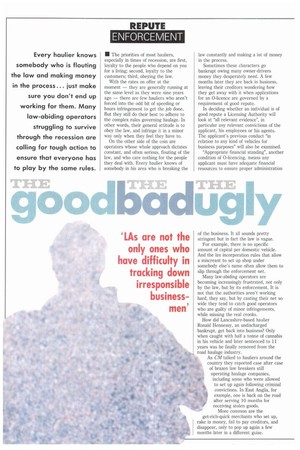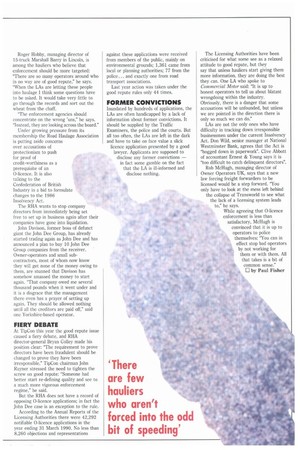lb ackily
Page 34

Page 35

If you've noticed an error in this article please click here to report it so we can fix it.
Every haulier knows somebody who is flouting the law and making money in the process ... just make sure you don't end up working for them. Many law-abiding operators struggling to survive through the recession are calling for tough action to ensure that everyone has to play by the same rules.
• The priorities of most hauliers, especially in times of recession, are first, loyalty to the people who depend on you for a living; second, loyalty to the customers; third, obeying the law.
With the rates on offer at the moment — they are generally running at the same level as they were nine years ago — there are few hauliers who aren't forced into the odd bit of speeding or hours infringement to get the job done. But they still do their best to adhere to the complex rules governing haulage. In other words, their general attitude is to obey the law, and infringe it in a minor way only when they feel they have to.
On the other side of the coin are operators whose whole approach dictates constant, and often serious, flouting of the law, and who care nothing for the people they deal with. Every haulier knows of somebody in his area who is breaking the law constantly and making a lot of money in the process.
Sometimes these characters go bankrupt owing many owner-drivers money they desperately need. A few months later they are back in business, leaving their creditors wondering how they get away with it when applications for an 0-licence are governed by a requirement of good repute.
In deciding whether an individual is of good repute a Licensing Authority will look at "all relevant evidence", in particular any relevant convictions of the applicant, his employees or his agents. The applicant's previous conduct "in relation to any kind of vehicles for business purposes" will also be examined.
"Appropriate financial standing", another condition of 0-licencing, means any applicant must have adequate financial resources to ensure proper administration of the business. It all sounds pretty stringent but in fact the law is vague.
For example, there is no specific amount of capital per domestic vehicle. And the lax incorporation rules that allow a miscreant to set up shop under somebody else's name often allow them to slip through the enforcement net.
Many law-abiding operators are becoming increasingly frustrated, not only by the law, but by its enforcement. It is not that the authorities aren't working hard, they say, but by casting their net so wide they tend to catch good operators who are guilty of minor infringements, while missing the real crooks.
How did Lancashire-based haulier Ronald Hennessy, an undischarged bankrupt, get back into business? Only when caught with half a tonne of cannabis in his vehicle and later sentenced to 11 years was he finally removed from the road haulage industry.
As CM talked to hauliers around the country they reported case after case of brazen law breakers still operating haulage companies, 4/ including some who were allowed 40. to set up again following criminal
convictions. In East Anglia, for 4 example, one is back on the road
after serving 10 months for .`11r receiving stolen goods. More common are the get-rich-quick merchants who set up, rake in money, fail to pay creditors, and disappear, only to pop up again a few months later in a different guise. Roger Hobby, managing director of 15-truck Marshall Barry in Lincoln, is among the hauliers who believe that enforcement should be more targeted: "There are so many operators around who in no way are of good repute," he says. When the LAs are letting these people into haulage I think some questions have to be asked. It would take very little to go through the records and sort out the wheat from the chaff.
"The enforcement agencies should concentrate on the wrong 'uns," he says. "Instead, they are looking across the board."
Under growing pressure from its membership the Road Haulage Association is putting aside concerns over accusations of protectionism to push for proof of credit-worthiness as a prerequisite of an 0-licence. It is also talking to the Confederation of British Industry in a bid to formulate changes to the 1986 Insolvency Act.
The RHA wants to stop company directors from immediately being set free to set up in business again after their companies have gone into liquidation.
John Davison, former boss of defunct giant the John Dee Group, has already started trading again as John Dee and has announced a plan to buy 10 John Dee Group companies from the receiver. Owner-operators and small subcontractors, most of whom now know they will get none of the money owing to them, are stunned that Davison has somehow amassed the money to start again. "That company owed me several thousand pounds when it went under and it is a disgrace that the management there even has a prayer of setting up again. They should be allowed nothing until all the creditors are paid off," said one Yorkshire-based operator.
FIERY DEBATE
At TipCon this year the good repute issue caused a fiery debate, and RHA director-general Bryan Colley made his position clear: "The requirement to prove directors have been fraudulent should be changed to prove they have been irresponsible." TipCon chairman John Rayner stressed the need to tighten the screw on good repute: "Someone had better start re-defining quality and see to a much more vigorous enforcement regime," he said.
But the RHA does not have a record of opposing 0-licence applications; in fact the John Dee case is an exception to the rule.
According to the Annual Reports of the Licensing Authorities there were 42,292 notifiable 0-licence applications in the year ending 31 March 1990. No less than 8,260 objections and representations against these applications were received from members of the public, mainly on environmental grounds; 1,361 came from local or planning authorities; 77 from the police... and exactly one from road transport associations.
Last year action was taken under the good repute rules only 44 times.
FORMER CONVICTIONS
Inundated by hundreds of applications, the LAs are often handicapped by a lack of information about former convictions. It should be supplied by the Traffic Examiners, the police and the courts. But all too often, the LAs are left in the dark and have to take on face value a slick licence application presented by a good lawyer. Applicants are supposed to disclose any former convictions — in fact some gamble on the fact that the LA is ill-informed and disclose nothing. The Licensing Authorities have been criticised for what some see as a relaxed attitude to good repute, but they say that unless hauliers start giving them more information, they are doing the best they can. One LA who spoke to Commercial Motor said: "It is up to honest operators to tell us about blatant wrongdoing within the industry.
Obviously, there is a danger that some accusations will be unfounded, but unless we are pointed in the direction there is only so much we can do."
LAs are not the only ones who have difficulty in tracking down irresponsible businessmen under the current Insolvency Act. Don Wild, senior manager at National Westminster Bank, agrees that the Act is "bogged down in paperwork". Clive Abbott of accountant Ernest & Young says it is "too difficult to catch delinquent directors".
Rob McHugh, managing director of Owner Operators UK, says that a new law forcing freight forwarders to be licensed would be a step forward. "You only have to look at the mess left behind the collapse of Transworld to see what the lack of a licensing system leads to," he says.
While agreeing that 0-licence enforcement is less than satisfactory, McHugh is convinced that it is up to operators to police , themselves: "You can in effect stop bad operators by not working for them or with them. All that takes is a bit of common sense."
El by Paul Fisher




































































































